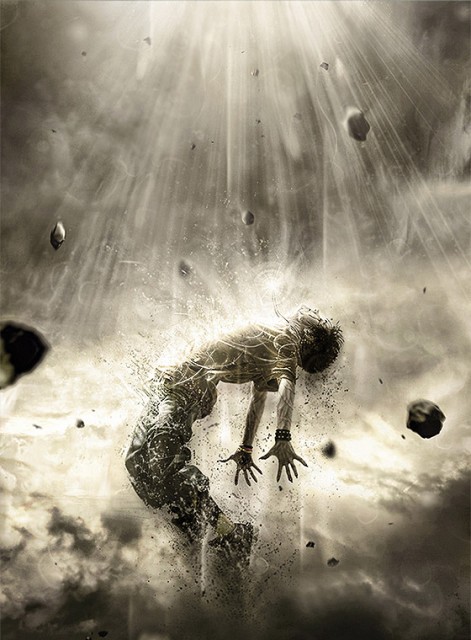Life in a digital world gives us illusion of certain kind of permanence. Each netizen puts out certain amount of content out into the greater web, be it via social media interactions, blogging or code commits on github. We all live digital footprints all over the internet, and those footprints are expected to hang around forever. Or at the very least, longer than they remain personally relevant to you. A blog post, or a shell script you written six years ago may only be a murky memory to you, and something that no longer represents what you stand for now, but they can still mean something to someone. The very fabric of the world wide web relies on this expectation of permanence of web resources. A hypertext link is a contract between the user and the author, that the resource to which it is pointing actually exist. When we click on words that are blue and underlined, we expect to see content and not a 404 error page.
But in the real world, 404’s happen. The archives of this very blog are full of dead and blind links to lead to videos that no longer play and blogs that no longer exist. This is unfortunately how it works right now. We are still living in a scarcity based economy, and hosting still costs money. So when authors lose interest in their works and stop paying hosting fees, said works vanish. Stuff that is hosted on free services is more insulated against author neglect, and tends to stick around much longer but it is not permanent either. It’s survival depends more on a corporate business plan, rather than on the attention span of the author. And corporations, which are legally people here in US, don’t have infinite patience either. Things that do not yield profit or draw in new customers will eventually get purged from their servers. See the great GeoCities apocalypse of 2009.
One day we might have free energy, and more storage space we will know what to do with, and we will be able to keep things around forever. In the meantime this sort of slow entropy of the web is something we accept as inevitability. The internet, being what it is, has found ways to route around bit rot, via mirroring. Content may disappear, but as long as a single person saved a copy, it can be re-uploaded elsewhere. The old hyperlinks will remain broken, but thanks to search engines, the content will likely be easy to locate.
In a way, this process works much like human memory, but on a much larger, distributed and grand scale. Content that is irrelevant or has no value to anyone simply fades away. On the other hand, things we have collectively decided are good and worth keeping get copied, mirrored and preserved for future generations to enjoy. Parts of the web may become broken due to natural entropy, but as a whole, the internet keeps on chugging. In fact, the damage and healing process makes it healthier by culling old spam and advertising crap.
But every once in a while, something else happens: and infosuicide. A beloved or respected member of a community suddenly disconnects and goes offline and takes all their content with them. Their blogs, social media accounts and source code repositories go away overnight. And it is not because their work ceased to be relevant, but rather because they no longer wished to participate in the digital life on the web. The two most famous examples of this was the disappearance of _why the lucky stiff in 2009 and Mark Pilgrim in 2011. Both men are reportedly still around, and in good health, but simply chose to unplug from the web for personal reasons. Internet of course recognized their disappearance as damage, and routed around it, so even though their work temporarily vanished when they left, their legacy has since been restored and preserved almost to the last bit of data.
Why did _why and Pilgrim choose to quit the semi-public life on net? We might never know the exact reasons (nor are we entitled to know them) but the very act of unplugging from the web strongly indicates a desire for privacy. It is shutting off the valve, closing the door, turning a new leave or starting a new chapter of their life. People do this sort of thing in real life all the time: they quit jobs, switch careers and abandon hobbies, and it is not considered all that strange. That people change and move on is a fact of life. But the internet is a weird place, where everything is interconnected. When your hobby is public and internet facing one, it is hard to quit it without people noticing.
When a popular writer stops writing, or a popular singer stops singing their fans do notice, but they don’t typically consider this a suicide equivalent. But when an internet person stops internetting, we coin a new word to describe it. Why is that? Perhaps it’s because digital celebrities have a more direct and intimate relationship with the people who consume their work. Both _why and Pilgrim were very active members of their respective communities, and the online technology circlejerk (yeah, you know that that’s what we’re doing – don’t even lie) as a whole. They were accessible and available, up until they were not. And that probably why people were so shocked by their sudden “disappearances”. Individuals who were there, day in and day out, suddenly fell of the grid erasing all of their footprints and contributions to the community. And while they did not disappear as real, flesh and bone people, their digital avatars were extinguished, their legacy living on only through imperfect third party mirrors.
The interesting question is how do infosuicides play into the greater scheme of transhumanity. Eventually, we might have capacity to live forever, if not in the flesh, then in some sort of a virtual form. And yet, our attention spans might always be finite. There is a great short story that I read years ago (before I started writing such things down for future reference) which described post-human lives of digitized people living in digital simulations. Their universe was a seemingly endless sea of simulated realities, both mundane and fantastic. People could freely move between them, but they were viewed as communities rather than places to visit. You would move into one of them, get to know your neighbors, develop relationships, pursue hobbies, accomplish your goals… And then eventually, you would get bored and move on to the next community. The process was strangely reminiscent of infosuicide: an individual would just get up one night, set their house on fire and leave without saying goodbye.
This might seem rude and inconsiderate, but it made sense in context. Moving away to another virch-world was the closest to perma-death these people could ever experience. You would leave alone and at night to save everyone the emotional trauma. You burnt your house so that it wasn’t there to remind people about you. But the goal of moving was always self preservation: to leave before soul crushing boredom and monotony drives you insane. You were moving to become a completely new person in a completely new world, and to do that you would cut all the old connections and often underwent elective memory surgery. It allowed immortals to live many fulfilling lives and be many things while unencumbered by their ever-lengthening past. It was an extreme measure but it seemed to be a right one for a civilization whose technology relegated time and space into meaningless metaphors. But it also spoke volumes about how they connected as people. Impermanence of relationships was implicitly built into their social contract.
We mortals don’t work that way. It is kinda funny that even though our lifespans are shockingly short, we speak in infinities when it comes to relationships. We bond forever. We marry “until death do us part”, with an implicit promise of continuation in case of afterlife. Once someone is in your social circle, they are never expected to leave, unless you have a falling out. Even if you drift apart in real life, you still are expected to, at the very least, post that obligatory “happy birthday” note on each other Facebook walls once a year. We extend that expectation of permanence to our online relationships as well – to people we have never met, and who we mostly know through their work, and brief online exchanges in regards to shared interests and hobbies. And when they disconnect, it is shocking, though perhaps it shouldn’t be. Perhaps this is something we need to learn to live with. This is something we might see more and more in the future.
Part of it has to do with privacy, which we are severely lacking right now. We live in a weird bubble of privacy deprivation right now. Most of our tools and communication media are built around noble concepts of openness and transparency, which is great, except they enable (or even encourage) us to over share. Combine this with excellent record keeping, and the culture of obsessive mirroring (the self healing property of the internet, which is great except when it isn’t) and incredible fidelity of our search algorithms and you get a strange digital panopticon where everyone can be doxxed, and their lives tracked, judged and analyzed. The more prominent you are within your community, the more naked you feel on he internet. Some of us thrive in this semi-public, semi-open, semi-exhibitionism of the internet. Others, not so much. Can you blame them for wanting to disconnect and live quieter, more private lives?
The web, as it exists right now, thrusts this openness and transparency upon you. It insists upon it, and while privacy tools and controls exist, it is still extremely easy to over-expose yourself, whereas maintaining privacy and separation between online and private life requires constant vigilance. This is already a problem, and it will only intensify as our lives become more and more tied to the electronic networks we create. One day we will inhabit these virtual spaces not metaphorically, but as immortal digital constructs. We really need to start building privacy controls and sane privacy defaults into our virtual spaces right now, before its to late and you’re getting snapshots of your consciousness being made and posted on torrent sites for lulz.
Here is another interesting question: given someone’s comprehensive body of work and digital footprints (blogs, tweets, facebook posts, forum duscussions – anything and everything they have ever posted online) will we one day be able to build a personality construct that would reliably and predictably mimic that person? This is not a novel concept after all. Just of the top of my head, Stross, Vinge, Stephenson and Simmons all had characters in their novels who were artists, poets or writers algorithmically “resurrected” from their works. While John Keats might have laid his soul bare in his poems to the point he could be digitally recreated in Hyperion Cantos, I’d venture a guess that one’s twitter and facebook feeds, and reddit comment history could be just as useful (if not more) for the same purpose. In fact, activity feeds and blogs might be easier to analyze and more algorithmically convertible into identifiable behavioral patterns than esoteric medium such as poetry.
So let’s say future community centered around some future programming language (let’s call it Emerald, just to continue the trend of Pearl and Ruby) has a whimsical and much celebrated mentor and teacher (let’s call him _where) who commits infosuicide. Could said community then take _where’s body of work, and clone themselves a digital copy of him to carry on the legacy? The new _where would not be an impostor – he wouldn’t be replacing _where the person, but instead would be a heuristic approximation of him, designed to carry on his spirit, ideas and continue guiding and contributing to the community. Legally he would be his own person, with no rights or claims on _where’s property, or accounts. Building him would likely not be illegal – or rather no more illegal than creating any kind of artificial intelligence. He would be merely a product of plugging bunch of publicly available records into some sort of neural network to produce a heuristic personality model. In many ways he would be a more perfect and focused _where than the original could ever even aspire to be. He would be an idealized, pure version of the original, based on his public image, with no personal baggage or inner turmoil.
If you think about this, it fits into the self-repairing pattern of the internet: disappearance of a mentor is treated as damage, and repaired by the community. They have their old mentor back, while the original gets to live a private quiet life he desired. Everyone wins?
The question is, is this right? Is this something we should be doing if it becomes possible? We have privacy laws that protect any and all information about you that you consider non-public. So stealing digital backups of your mind and bootstrapping a copy of you based on them would surely be illegal. But making an imperfect copy based on recordings of your public appearances and the body of the content you make available online, could very well be perfectly legal. But would it be morally right? Not only with respect to you, but also to the construct who (if self aware) has to live with the burden of being a mere shadow of someone else.
What do you think?








There are probably tons of links to URLs on my server that return 404s. Over the years contents come and go. I actually maintain a mixed ‘resources’ folder which contains images and stuff I used in different forums and that is linked from there. Sometimes things get lost and you don’t even realize it. I had a subdomain which hosted a large creative commons graphics packet as mirror-server – as the server had a serious hardware issue and was replaced some time ago, I had to reinstall it. I just forgot that subdomain even existed …
It is possible that our society will leave few traces in history. We know about those who carved their words in stone, we know little about older societies that wrote texts on paper or wood.
Most of the information about our technologies and society are stored on physical objects that probably last a few decades …
@ Eric:
Yeah, it is quite scary that future generations may actually know more about Ancient Egypt than about the 21st century. That said, digital information is easy to copy. So as long as we keep moving the pieces we care about, we will be able to preserve them despite the perishability of the underlying media.
In fact, the short lifespans of our hardware might in fact improve the amount of data we preserve. Given a very resilient, long-term storage method, we might be tempted to just leave the data be, and not touch it. And if we do, we might one day find ourselves locked out of it, possessing neither the hardware, nor the specs for the file types and retrieval algorithms needed to read it. Since our hardware deteriorates quickly, important information will be continuously moved and converted to modernized formats, making it readily available and accessible to future generations.
I was just thinking about the permanency of digital data on the way to work.
I guess I always assumed it wouldn’t be permanent, and so it didn’t bother me.
I hate to sound terrible but, I believe the impermanence would only affect those whom invested much of their time into the digital life. One exception I can think of is personal digital pictures, of which may diminish in quality assuming people continue to store them in lossy formats (I doubt this will continue very long).
It will be interesting to see the progress of whether the niche of lossless music/etc continues on to be mainstream. I believe it will, as people continue to have more data storage capacity.
What’s mind boggling is the idea that people are using an impermanent medium to transmit much of their thoughts, and so ridiculously miss out on a lot of what people seem to value in life: actual human interaction. And it is this we substitute with entertainment.
Websites I remember from my youth or GeoCities that disappeared can actually be found on the way back machine internet archives project.
They actually have quite a lot of things still preserved there. Its even interesting to see the evolution of the web too.
>Could said community then take _where’s body of work, and clone themselves a digital copy of him to carry on the legacy?
No. Some sort of neural net could create a realistic simulation of a person’s manners of speech, etc. it would be extremely hard to make a simulation that can have new ideas, and _why’s contributions to the community were mostly because of new ideas. Once you get to the point where the real person can stop caring, and a simulation of the person, at the point when they stopped being part of the community, you have an AI. And once you have an AI, why make it recreate a human? It would be better just to have the AI be it’s own person, and not be _why 2.0.